Countless times in fiction we’ve seen heroes pull off daring heists, avenge the deaths of loved ones, and vanquish colossal foes (whilst causing considerable collateral damage), but what might happen if they didn’t get away with it? What does it look like in science fiction and fantasy when a character finds themselves behind bars, whether literal or only figurative? Here are five books that explore that very question.
Camp Concentration, Thomas Disch
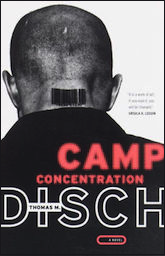 You could be excused for thinking that the title of Thomas Disch’s 1968 novel is a simple play on the term ‘concentration camp,’ but delve into the book and you’ll find it’s not as simple as that. Locked up at a subterranean prison called Camp Archimedes, Louis Sacchetti is tasked with monitoring an experimental program whereby inmates are infected with a strain of syphilis designed to break down mental walls and provide genius-level intellect. Similar to Kurt Vonnegut’s Mother Night, Camp Concentration uses the device of journal entries to tell its story, but where Vonnegut’s novel follows a free man who many consider a war criminal, Camp Concentration is the story of a writer imprisoned as a conscientious objector to an unpopular war.
You could be excused for thinking that the title of Thomas Disch’s 1968 novel is a simple play on the term ‘concentration camp,’ but delve into the book and you’ll find it’s not as simple as that. Locked up at a subterranean prison called Camp Archimedes, Louis Sacchetti is tasked with monitoring an experimental program whereby inmates are infected with a strain of syphilis designed to break down mental walls and provide genius-level intellect. Similar to Kurt Vonnegut’s Mother Night, Camp Concentration uses the device of journal entries to tell its story, but where Vonnegut’s novel follows a free man who many consider a war criminal, Camp Concentration is the story of a writer imprisoned as a conscientious objector to an unpopular war.
While much of Sacchetti’s journal chronicles his efforts to hold onto his sense of self while in prison, he also details the actions and aspirations of the other prisoners, and even the staff of Camp Archimedes. Some of the prisoners use their newly-gifted intelligence to re-examine alchemical theories abandoned centuries earlier, but their objectives seem to pale in comparison to one of the warders whose goal is nothing less than the destruction of the entire human race.
It’s a dryly and darkly funny book, filled with references to Dante’s Inferno, Faust, the Bible, the operas of Wagner, and much more, with the pomp and prestige of these works standing juxtaposed against the depressing grimness of the prison’s underground setting.
Going Postal, Terry Pratchett
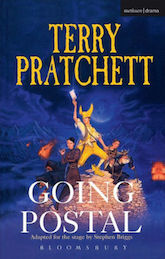 Can a person be imprisoned by their job? I think many of us would say yes, particularly if you were overseen by a relentless golem parole officer, and if the only alternative was death.
Can a person be imprisoned by their job? I think many of us would say yes, particularly if you were overseen by a relentless golem parole officer, and if the only alternative was death.
Terry Pratchett’s Going Postal opens with the infamous con man, forger, and all around petty criminal Moist von Lipwig on death row, desperately trying to scrape his way to freedom using a spoon. Alas, the spoon represents only the prospect of escape, and Moist soon finds himself at the business end of a hangman’s rope – but the Patrician, Havelock Vetinari, has other plans.
You see, Moist has a completely forgettable face, and despite a long criminal career and a very public (near-)hanging, nobody in the entire city can recognise the master of disguise. So what better to do with an unrepentant criminal than set him loose amongst the unrepentant criminals of big business? Overseen by the golem Mr. Pump, Moist is given the job of bringing the region’s disused postal service back from the dead, a job that puts him right in the crosshairs of Reacher Gilt—a businessman and con artist of such skill that Moist can’t help but respect him.
In Going Postal, the late Terry Pratchett shows once again why he was the master of not just comedy, but also of character, plotting, and intrigue.
Bitch Planet, Kelly Sue DeConnick, Valentine De Landro
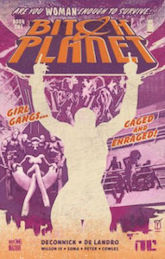 Bitch Planet is the story of a group of women caught in an off-world prison, in a setting that’s part far-flung future, part misogynistic past, and part all-too-recognisable present. In the world of Bitch Planet women are second-class citizens, and any woman who refuses to bend and scrape to male authority figures—whether that’s a husband, father, or the Fathers who run the patriarchal society—will find themselves marked as Non-Compliant. These women living on Bitch Planet are kept out of sight and out of mind, left to toil and die, more valuable as players of the death sport known as Megaton than as free members of society. Only on the playing field is their anger and violence allowed to be exhibited—and even then only so these tough, capable women can be used as an example for any other women that might dare challenge the status quo.
Bitch Planet is the story of a group of women caught in an off-world prison, in a setting that’s part far-flung future, part misogynistic past, and part all-too-recognisable present. In the world of Bitch Planet women are second-class citizens, and any woman who refuses to bend and scrape to male authority figures—whether that’s a husband, father, or the Fathers who run the patriarchal society—will find themselves marked as Non-Compliant. These women living on Bitch Planet are kept out of sight and out of mind, left to toil and die, more valuable as players of the death sport known as Megaton than as free members of society. Only on the playing field is their anger and violence allowed to be exhibited—and even then only so these tough, capable women can be used as an example for any other women that might dare challenge the status quo.
It’s a timely comic—sadly so—and Valentine De Landro’s art is clean and bold, using bright colours and Ben-Day dots to anchor it in the (often sexist) history of comics. Kelly Sue DeConnick’s skills as a writer are clearly on display here as she explores the lives of these women and brings both the prison and external society to life. With the dialogue of many of the men in Bitch Planet, she shows how it’s possible to be sexist without being crude, deftly holding up a mirror to our society and showing just how insidious misogyny can be.
The Quantum Thief, Hannu Rajaniemi
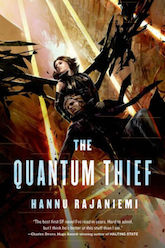 Trapped by Archons in the Dilemma Prison, Jean le Flambeur—the famous thief and raconteur—is faced again and again with variations of the prisoner’s dilemma, pitted against other criminals and other versions of himself in an endlessly iterative attempt at rehabilitation through game theory.
Trapped by Archons in the Dilemma Prison, Jean le Flambeur—the famous thief and raconteur—is faced again and again with variations of the prisoner’s dilemma, pitted against other criminals and other versions of himself in an endlessly iterative attempt at rehabilitation through game theory.
The original prisoner’s dilemma involves interrogating two prisoners, where if both prisoners stay quiet, they will both get a one year sentence, if one prisoner betrays the other (who remains quiet) they would go free at the expense of a worse sentence for the other prisoner, or where both prisoners betraying the other winds them both with a two year sentence. But when you run an infinitely iterative prison, things do tend to get boring, so simple interrogations are replaced by pistol-packing duels, games of chicken on an endless highway, or trench warfare. No matter the scenario there are always two choices: self-interest and betrayal, or cooperation.
When we first meet Flambeur, he’s not feeling too cooperative—and for his attempted betrayal of a fellow prisoner he’s treated to a bullet through the skull, rendered painfully, utterly real…until the whole dilemma is reset once again.
If all this sounds weird and deep and interesting (and the above is just the beginning—only the first few pages of the novel) then I’ve done a decent job of explaining it—if not, all blame should lie with the author of this article, and not with Hannu Rajaniemi, whose debut novel The Quantum Thief is an utterly unique slab of post-cyberpunk intrigue.
Welcome to Orphancorp, by Marlee Jane Ward*
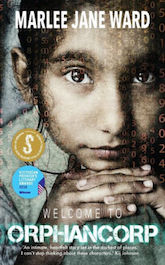 In fiction, orphanages are rarely—if ever—shown to be warm, welcoming environments. They’re home to hurt and hurtful children, damaged by their abandonment, left to lash out at one another for lack of any better pastime or any better target. But what happens if you took those broken children and placed them into an orphanage that was run like a for-profit prison, where every child had to work to pay their way through their imprisonment, where the caretakers are more like prison guards, and where the whole system has been set up to institutionalise the children, setting them on a path that would likely lead them to an actual prison?
In fiction, orphanages are rarely—if ever—shown to be warm, welcoming environments. They’re home to hurt and hurtful children, damaged by their abandonment, left to lash out at one another for lack of any better pastime or any better target. But what happens if you took those broken children and placed them into an orphanage that was run like a for-profit prison, where every child had to work to pay their way through their imprisonment, where the caretakers are more like prison guards, and where the whole system has been set up to institutionalise the children, setting them on a path that would likely lead them to an actual prison?
Well, then you’d have the U.S. penal system. Sorry, I meant: Well, then you’d have Marlee Jane Ward’s fantastic novella, Welcome to Orphancorp.
Mirii Mahoney is a week away from her eighteenth birthday, and thus a week away from aging out of the corporate prison system and finally tasting freedom. All she needs to do is stay out of trouble for seven days, but the whole system is stacked against her, and Mirii is terrible at keeping her nose clean, particularly when one of her friends needs help.
Welcome to Orphancorp is a big story packed into a small book, with a unique voice, subtle world-building, and a whole lot of heart.
*Full disclosure: Marlee Jane Ward happens to be my partner, but given that the book has won a couple of awards and has been shortlisted for several others, I’m clearly not the only one who thinks it’s great.
 Corey J. White is a writer of science fiction, horror, and other, harder-to-define stories. He studied writing at Griffith University and is now based in Melbourne, Australia. Killing Gravity and its sequel, Void Black Shadow, are available from Tor.com Publishing. Find him at coreyjwhite.com and on Twitter at @cjwhite.
Corey J. White is a writer of science fiction, horror, and other, harder-to-define stories. He studied writing at Griffith University and is now based in Melbourne, Australia. Killing Gravity and its sequel, Void Black Shadow, are available from Tor.com Publishing. Find him at coreyjwhite.com and on Twitter at @cjwhite.










